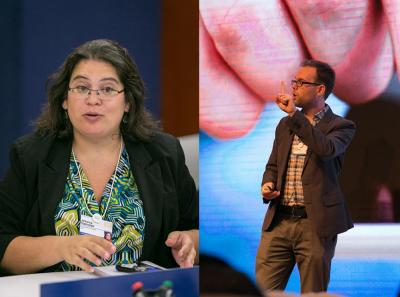Hammer, Harrison Among WEF Young Scientists

The HCII's Jessica Hammer and Chris Harrison were among 30 exceptional young scientists under the age of 40 recognized at the World Economic Forum’s Annual Meeting of the New Champions, Sept. 10–12, in Tianjin, China.
This year’s Young Scientists were selected for their contributions to advancing the frontiers of science, engineering or technology in areas of high societal impact, the WEF said. At the Tianjin meeting, they engaged with business and political leaders to contribute their scientific perspective and deliver the most up-to-date trends.
Hammer, who joined the faculty in January, studies the psychology of games, focusing on the way specific game design decisions affect how players think and feel. She also develops games that enhance education or otherwise improve lives. She is one of the investigators for a multiyear, Google-sponsored research effort to unlock the educational potential of massive open online courses (MOOCs). Hammer was featured at the WEF meeting in a session, “Better, Faster, Smarter,” that addressed how smarter computers can improve education and learning.
Harrison, who earned his Ph.D. from the HCII before joining its faculty early this year, heads the Future Interfaces Group, which broadly investigates novel sensing technologies and interaction techniques that foster powerful and natural interactions between humans and computers. His inventive work on interfaces such as Skinput, which enables people to control computers by tapping their skin, and WorldKit, which can turn almost any surface into a touchscreen, has received worldwide coverage by the news media. He was featured at the WEF meeting in a session titled “Tomorrow’s Consumer Tech.”
Hammer and Harrison were among a healthy contingent of Carnegie Mellon faculty members attending this year’s "Summer Davos." Click here for more information on the event.

